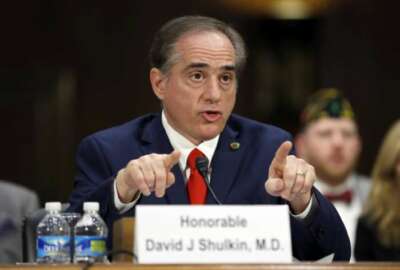

Senators have two very different proposals to redesign the Veterans Choice Program. Both pieces of legislation represent very different ideologies and sides of ...
Senators are circling around a few different alternatives to redesign the Veterans Choice Program.
At least two of the legislative proposals represent very different ideologies and sides of a debate that Congress, the Veterans Affairs Department, veterans service organizations and federal employee groups have been having for the past three years.
Senate Veterans Affairs Committee Chairman Johnny Isakson (R-Ga.) introduced legislation that would give all enrolled veterans the ability to choose to receive care from an eligible community care provider. Under the Veterans Choice Act of 2017, those veterans would receive a “Choice card” that would indicate their eligibility to receive private care.
The committee’s ranking member, Sen. Jon Tester (D-Mont.), is taking a different approach. He introduced the Improving Veterans Access to Community Care Act of 2017. Tester’s bill more closely resembles the proposal that VA Secretary David Shulkin presented to Congress last month. Veterans who meet certain criteria would be eligible to receive care from a private sector provider.
Both pieces of legislation would consolidate the seven different ways VA currently offers community care.
“Rather than just giving the veteran a card to seek care in the private sector, I believe the VA must continue to serve as a coordinator and a primary provider of care, while the private sector fills in the gaps,” Tester said.
Dr. Baligh Yehia, deputy undersecretary for health for community care at the Veterans Health Administration, wouldn’t pick a favorite and said each bill had its strengths and weaknesses.
Ultimately, he said the department is looking for a few broad principles in a new legislative proposal. A new bill should empower veterans to receive health care at the right time, from the right provider.
“The department must be able to establish a high-performing network of providers who can furnish the very best care,” Yehia said. “To do this, we must have flexibility, flexibility in payment rates, in the type of agreements we form with providers. In addition, we must have flexibility in our ability to simplify our interactions with community providers, so we can pay timely and accurately, and we can share information more easily between the two.”
The new bill also shouldn’t be too prescriptive. The current Veterans Access, Choice and Accountability Act has too many details that put too many restrictions on the department’s ability to react to patient needs, Yehia added.
Both the chairman and ranking member said they were confident the committee could reach a compromise.
They’re under a tight timeline to develop new legislation.
VA is quickly running out of money in its Veterans Choice Program account. Without the congressional authority to transfer funds from one account to another, the department predicts it will run out of money to pay for veterans’ care in the community before the end of the fiscal year.
Tester introduced a bill Tuesday that would give VA the funding it needs for the Veterans Choice Program this year.
“It would bolster VA’s internal capacity to provide care. It would make it easier for VA to provide care to vets closer to home by authorizing leases and getting pre-9/11 caregivers the help that they’ve needed for decades. I’d like to have your reaction to this legislation, because there are some folks that do not believe that we should be tackling internal VA care and caregivers in the same legislation as providing funds for private sector care [on] an emergency basis,” he said to a panel of witnesses from four veterans service organizations.
The VSOs said veterans are already seeing the effects of coming shortfall and are waiting in line for VA care because the department lacks sufficient funding to send them to a community provider.
“As a committee, we need more time than we received on this,” Tester said. “We were supposed to be funding November/October, and then it was June and then it was August.”
Yet Democrats continue to be concerned by their colleagues’ legislative proposals. They fear putting more resources into the private sector and giving veterans “unfettered” access to community providers would dismantle VA. Congress should pass new legislation that builds on VA’s internal capacity, they said.
“While we want to give veterans choice, we do not want to do it in a way that dismantles the VA,” Sen. Bernie Sanders (I-Vt.) said. “What I worry about is that at a time when the VA has [49,000] vacancies, when many parts of this country are understaffed, there may well be funding coming out of the VA to fund the Choice program, and that does concern me very, very much.”
Many veterans service organizations share that concern.
“Allowing veterans the open-ended ability to seek care in the private sector is a concern,” Amy Webb, national legislative policy adviser for AMVETS. “On the one hand, choice sounds like a great proposition, but on the other we’re concerned that implementing a broader choice program will either intentionally or unintentionally dismantle the VA health care system. This, we oppose.”
For Tester those solutions to strengthen the department’s internal capacity would come from the Better Workforce for Veterans Act, which he introduced last month. The legislation would expand direct hiring authority in the case that VA has a shortage of qualified applicants for specific positions.
“This workforce bill … focuses on recruiting, hiring and retaining a talented workforce for VA,” Tester said. “VA has some well known human capital challenges, and my bill begins to address that.”
It would also allow the department to use direct hire authority for qualified recent graduates and current post-secondary students to competitive positions at VA.
The legislation requires the VA undersecretary for health to develop a plan for improving and holding senior leaders accountable for employee engagement. It asks the undersecretary to consider establishing a specific office within VHA dedicated to improving employee engagement.
In addition, the bill would let VA to use market pay to set salaries for medical center and Veterans Integrated Service Network directors.
The bill would also:
VA said it agrees with several of the provisions in the bill but not all of them.
Copyright © 2024 Federal News Network. All rights reserved. This website is not intended for users located within the European Economic Area.
Nicole Ogrysko is a reporter for Federal News Network focusing on the federal workforce and federal pay and benefits.
Follow @nogryskoWFED


